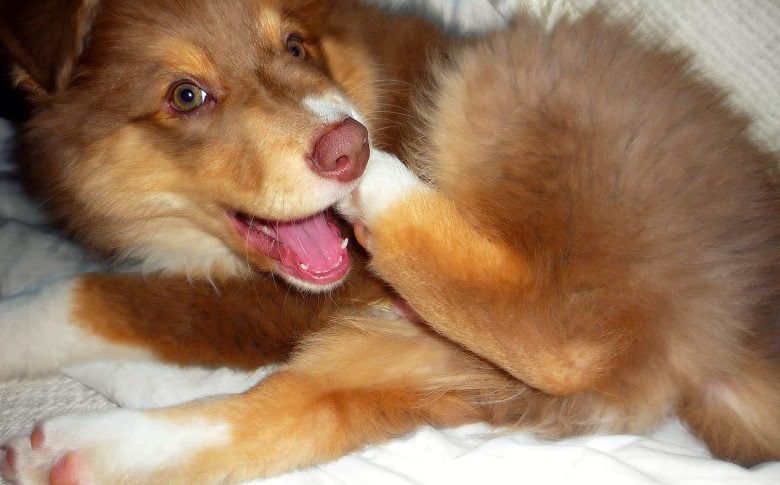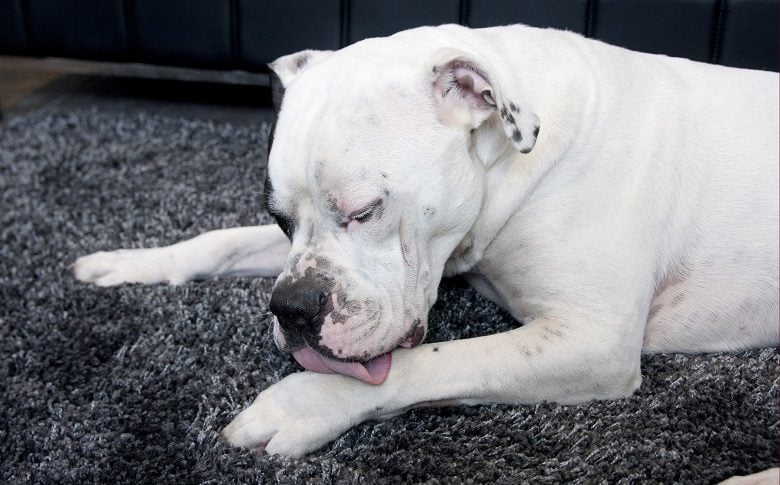Why Is My Dog Chewing His Nails And How To Prevent It?

Table of Contents
Unlike humans, a dog must rely on their teeth and not their fingers to resolve many issues for them.
Picking up food, eating their dinner, using the bathroom, and even relieving themselves of itches and other irritating feelings they have on their body.
If you’ve seen your dog chewing their nails or around their paws recently then you should pay attention to the signs they’re showing you. Although it’s likely they’re not in any distress, it could be something uncomfortable or even slightly painful they’re dealing with, so it’s up to you to help them out.
Why do dogs chew their nails?
A dog might chew or bite around there nails and paws because of an itch or irritation, which can be caused by fleas, an infection, dog allergies, or an injury to the area. As they use their teeth like their fingers, it usually means there’s something there they’re trying to fix, so you’ll likely have to investigate further to determine the source.
For a dog chewing nails, there are lots of ways you can help relieve them of the issue but first, you’ll need to know why they’re doing it. This guide can show you the potential cause of your dog’s nail problem and help you alleviate their irritation, so they can get back to being a playful pup without a care in the world.
Is It Normal for a Dog to Chew Its Nails?

A dog relies on its mouth and teeth to do a lot of work for it, just as we use our hands, so it can look alarming to notice them chewing away for what seems like an eternity.
If you’ve noticed that your dog is spending a lot of time biting their nails or chewing their paws, there’s no need to fret.
For dogs, this is pretty standard behavior, and it usually means there’s an itch or irritation they’re trying to reach. As a responsible pet owner though, we need to pay attention when they start doing it, and if you feel that it’s been going on too long or they seem distressed, then you need to step in and help them out.
In most cases, your dog will be able to sort this out themselves, and it could be as simple as picking loose a prickle that’s been embedded in their paws. Other times, they could need their human’s assistance, whether it’s to clip their nails to a comfortable level or take them to visit the vet and get them checked out, so it’s worth looking out for.
Signs Your Dog is Biting His Nails
The most obvious sign that your dog has been biting or chewing their nails is because you’ll spot them doing it. However, there are other things you can look out for
- Restlessness
A dog that can’t sit still or one that finds it hard to have a quiet sleep could be dealing with issues that can also affect their nails and paws.
- Patchy hair
The biggest sign will be a lack of hair or patchy skin where they’ve been chewing. You might be able to see the skin underneath their paws where the hair usually is if they’ve been particularly aggressive.
- Skin irritation
An irritated patch of skin either around their paws or on the rest of the body could be an indication of an allergy or another condition that’s causing them to itch.
- Other areas of trouble
If you’ve picked up issues on the rest of their body like skin conditions or an injury, and you notice that they’re also biting their nails, it’s likely to be an all-over problem.
The Reasons Your Dog Might Be Chewing

Seeing your dog spending too much time chewing their nails or biting their paws can be distressing after a while. There’s usually a good reason for all of the attention they’re giving this area, so as a responsible owner, you need to rule out the possibilities so that you can help them fix it.
- Skin infections and conditions
Dogs can become infected from things like a minor cut on the skin or an insect bite, and if it’s near their paws, this can lead to nail chewing. Other conditions like mange can also cause dogs to bite and chew, so if you think it’s something more serious, you should take them to the vet post haste.
- Long nails
Dogs need their nails trimmed regularly, depending on their breed, and when they’re overgrown it can be uncomfortable for them. A dog with long nails will try to chew them down so they can walk properly, so check this area out to make sure it doesn’t need your attention.
- Allergies
When a dog is allergic to something, it will react much like a human, with itching being a common symptom. Dogs can be allergic to foods, medication, synthetic fragrances and detergents, and seasonal changes. There is anti-histamine medication available for dogs to treat this, or you can look at things that might need to be changed at home.
- Injuries
If your dog has recently been injured they might try to heal the area by licking and chewing around it. Check out your dog’s paw for any signs of trouble and have them looked at by the vet if you find anything.
- Fleas and ticks
Fleas and ticks love to hide in small spaces, and what better place to stay discreet than a dog’s paw. A quick check over of your dog after visiting areas that are prone to ticks is a good idea. Regular flea and tick treatments should be provided and grooming that ensures they’re free from infestation.
- Anxiety
Sometimes the root cause of your dog’s nail chewing might not be physical at all, but rather an emotional or mental response. Dogs can act out in certain ways when they’re feeling anxious and chewing their nails is a popular one. Take note of whether your dog stops this behavior when you make an effort to calm them, and if so, it could be due to something in their head.
How to Prevent Nail Chewing in Dogs

The prevention is better than the cure with most things in life, and the same goes for your dog and their pesky nail chewing problem. The best way to ensure that your dog is comfortable and has no need to bite their paws on the regular is to follow these tips for basic care.
Keep them groomed
The simple act of grooming your dog, having their hair clipped, and their nails trimmed can do wonders for their health and wellbeing. A dog’s nails have can be uncomfortable when they grow too long, and since they can’t visit the nail salon themselves, you’ll have to step in to help.
Use quality dog products
Make a point of only purchasing products that are made by reputable brands when it comes to your dog. Dog toys should be of the highest quality, their dog food should be full of good ingredients, and their bed and other care products should be suitable for pets. This will keep them happy and ensure their skin and fur are comfortable.
Inspect them regularly
Dogs aren’t able to tell us exactly what’s wrong, so you should make a point of giving them a thorough checking over once a week to look out for them. Look for signs of injury, infestation, skin conditions, and anything else that’s worrying, and have them seen too if needed.
Related Questions
As our four-legged friends aren’t able to speak human, we have to look and listen for other clues they could be giving us about their health and wellbeing.
Read some FAQs about dog health to give you more information about how to help out your pooch and keep them happy, and what to look out for.
Why Is My Dog Licking Her Dewclaw?

If you’ve noticed your dog licking its dewclaws rather than biting its nails, it likely has an injury there.
When these claws break or tear, they can cause a lot of pain, and if left untreated, the condition can turn into an infected site. Your dog will likely respond to this by licking the dewclaws to try and soothe them, indicating they need help from a vet.
How Can I Soothe My Dog’s Itchy Skin?
A dog might sometimes get irritated skin that leads to a lot of scratching and biting all over their body. If this sounds like your dog, you should have them assessed by a vet to make sure it’s nothing serious, and then treat the problem.
There are medicated anti-itch creams, washes, and tables for dogs, otherwise, consider what might be causing the itch around the home.














